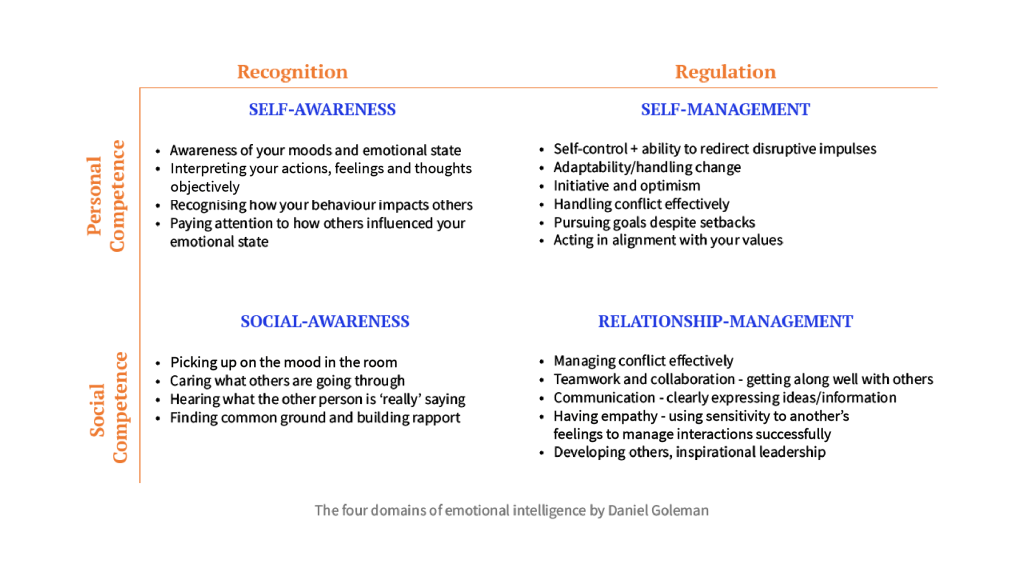For years we have measured intelligence by how ‘smart’ individuals are, assessing reasoning and problem-solving abilities. However, now we are shifting to focus attention towards an individual’s emotional intelligence to understand how emotional and social skills impact leadership abilities.
In today’s dynamic and fast-paced business landscape, leaders need to have the ability to understand and manage emotions, both within themselves and among their team members. Studies have shown that emotional intelligence plays a significant role in leadership, interpersonal relationships, decision-making, and overall life satisfaction.
This blog explores the importance of emotional intelligence in leadership, focusing on the four key emotional intelligence elements; self-awareness, self-management, social awareness, and relationship management.
What is emotional intelligence in leadership?
Emotional intelligence in leadership refers to the capability to recognise and understand one’s own emotions and those of others and to use this understanding to guide behaviour and decision-making effectively. Research conducted with Fortune 500 CEOs found that 75% of long-term job success depends on people skills, while only 25% on technical knowledge. Accordingly, leaders with emotional intelligence are better equipped to build positive work environments, manage conflicts, motivate their teams, and adapt to change more successfully.
Components of emotional intelligence
Psychologists Peter Salovey and John Mayer first outlined the concept of the four components of emotional intelligence. They introduced the framework of emotional intelligence and identified four key components in their influential article “Emotional Intelligence” published in 1990. While this early paper focused more broadly on the psychological aspects of emotional intelligence, the concept has been further developed and expanded upon by other researchers, most notably Daniel Goleman. Goleman’s book “Emotional Intelligence” highlights the influence of emotional intelligence on areas such as team performance, employee engagement, and the ability to inspire and motivate others.

Self-awareness
Self-aware leaders deeply understand their emotions, strengths, weaknesses, and values. They can recognise their impact on others and make conscious choices that align with their values and goals. While we may not always recognise good self-awareness in leaders, if you have ever worked with a leader that lacks self-awareness, you’ll be sure to appreciate the importance of this trait in a leader.
Self-management
Leaders with strong self-management skills demonstrate adaptability, resilience, and self-control in facing challenges. They can inspire confidence and stability within their teams by managing their emotions effectively. According to recent research, 80% of employees consider emotional intelligence crucial for developing their careers.
Social awareness
Socially aware leaders are attuned to the emotions and needs of others. They possess empathy and can accurately read nonverbal cues. This allows them to foster positive relationships, build trust, and create an inclusive work environment.
Relationship management
Effective leaders excel in relationship management by leveraging their emotional intelligence to establish and nurture connections. They communicate clearly, resolve conflicts constructively, and inspire their team members to achieve their full potential.
So, why does it matter?
The importance of emotional intelligence in leadership cannot be overstated. Emotional intelligence plays a vital role in effective leadership, allowing leaders to navigate challenges, build strong relationships, and inspire their teams. Recent research has shown that organisations that value and widely use emotional intelligence are 3.2x more effective at leadership development. Furthermore, emotionally intelligent companies report higher levels of empowerment, risk tolerance, enhanced customer experiences, loyalty, and advocacy.
Tips: Driving Emotional Intelligence in your leadership team
Invest in training
Offering specific training programs focused on developing emotional intelligence skills helps foster a culture which promotes and values emotional intelligence. Despite the growing awareness around the importance of emotional intelligence, only 42% of companies surveyed by LHH stated they provide specific training to help employees cultivate emotional intelligence. This is your team’s opportunity to get ahead.
Encourage feedback and reflection
Create an environment where emotional intelligence is valued and rewarded. Encourage open communication, empathy, and respect among team members. Creating opportunities for leaders to receive feedback on their emotional intelligence skills is important. Encourage reflection and self-improvement to enhance their abilities continuously.
Incorporate emotional intelligence in hiring and promotion processes
Assess emotional intelligence during the selection and promotion of leaders. Research has shown that nearly a third of HR managers think employers don’t prioritise emotional intelligence enough during the hiring process. Incorporate behavioural interview questions and assessments that gauge emotional intelligence competencies.
As the research indicates, prioritising emotional intelligence in leadership development can improve organisational performance and overall success. By developing and nurturing emotional intelligence within your leadership teams, you can enhance your organisation’s ability to navigate challenges, build strong relationships, and drive success. Leaders who possess emotional intelligence can inspire and motivate teams, foster a positive work environment, and adapt to the ever-changing business landscape.
Emotional intelligence is just one of the topics in our Quirk Academy programme, which will launch in September. If you’d like to know more about this and the other topics, don’t hesitate to contact our Commercial Manager, Adam Sturgeon, at [email protected].



